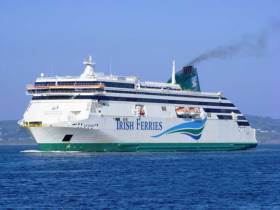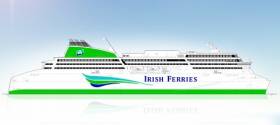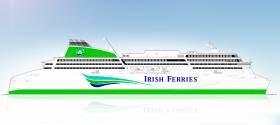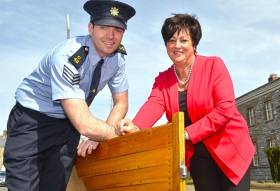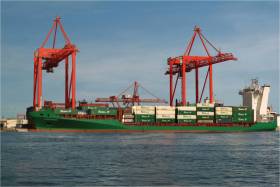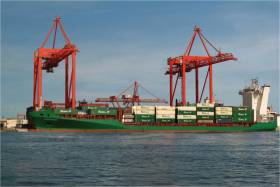Displaying items by tag: Irish Ferries
Flagship to Fast Ferry Take Turns for Annual Overhaul
#Overhauls- Ulysses flagship of Irish Ferries departed today fresh from annual overhaul having dry-docked at Cammel Laird, Birkenhead on Merseyside, writes Jehan Ashmore.
From Birkenhead the 50,000 gross tonnage Ulysses the 1,875 passenger/ 1,342 car capacity giant proceeded in the early hours along the north Wales coast to Holyhead. The repositioning passage is understood to have almost taken seven hours with an arrival at Anglesey just after 08.00hrs.
Currently occupying a dry-dock of the Merseyside facility is that of Dublin-Holyhead fleetmate, high-speed craft HSC Jonathan Swift. The 800 passenger/200 cars fastferry is also undergoing routine maintenance work. Launched in 1999 as an Austal built Auto Express 86m fastcraft ferry in Fremantle Australia, the 5,000 tonnes catamaran is the only such type of vessel operating between Ireland and the UK.
For almost two decades the ‘Dublin Swift’ as she is marketed has been the workhorse of the Irish Sea operating on the 1 hour 49 minute crossing. Each crossing is at 40knots /80kph on the 60 nautical miles / 111 Kms route which totals annually to an impressive 162,000 Kms.
There is another fastcraft, Manannan but this ferry only operates between the Isle of Man and Liverpool and seasonal calls elsewhere to include Dublin Port.
Providing sailing coverage whilst Ulysses was off service and now that of Jonathan Swift fast is that of Isle of Inishmore which in recent weeks was transferred from Rosslare-Pembroke. The cruiseferry having taken the roster of Ulysses. This is set to change as Ulysses resumes on an afternoon crossing bound to Dublin, permitting Isle of Inishmore to also receive attention of annual overhaul.
Taking her place on the Rosslare-Pembroke service since late last year so to cover demands of seasonal capacity on the busy Dublin route, is Oscar Wilde which does not sail at this time of year to France. The cruiseferry however is to resume service with a crossings from the Wexford port to Cherbourg beginning in March.
Returning to the Dublin-Holyhead route which is also operated by ropax Epsilon. As previously reported on Afloat, the chartered Italian flagged ferry made her first sailing of 2017 on the weekend round trip Dublin-Cherbourg connection.
Epsilon Enters Fifth Year of Service of Five Strong Ferry Fleet
#FrenchFerry - The first sailing in 2017 of Epsilon on the Ireland-France route of Dublin-Cherbourg operated by Irish Ferries took place yesterday, writes Jehan Ashmore.
Under overcast skies yet flat calm seas, Epsilon departed Dublin Bay in mid-afternoon where the only vessel at anchorage was asphalt/bitumen tanker Iver Ability. The 106m ship is at the centre of cargo ‘issues’ following an investigation of a fire due to a reaction on board during tranport of bitumen into Dublin Port last summer and has since remained at anchor.
The New Year marks as the fifth year of the chartered Italia flagged Epsilon under Irish Ferries operations but based on ‘economy’ class service on the French route. Three months into service the prefix of the ropax name, Cartour Epsilon was dropped. This was to remove the connection with previous operator, Caronte & Tourist SPA, Italy from where she served routes to Sicily.
At the time of posting Epsilon is docked in Cherbourg having completed the 17 hour 30 minute crossing from Dublin Port with an arrival this morning. As of this afternoon in the Normandy port is where rival Stena Line’s ropax, Stena Horizon departed and is bound for Rosslare tomorrow morning. Also in port is Brittany Ferries Barfleur one of several in the fleet serving on the English Channel in this context Cherbourg-Poole.
In addition the ropax 500 passenger/500 car capacity Epsilon serves during the week Dublin-Holyhead crossings and is due to dock in Dublin tomorrow morning before resuming such duties. Epsilon supports Walsh route regulars the fastcraft Jonathan Swift and flagship Ulysses currently off service, see report on Cammell Laird.
Taking the roster of Ulysses is routine Rosslare-Pembroke ferry Isle of Inishmore which in turn has been replaced on the southern corridor by Oscar Wilde. The cruiseferry during the winter does not operate out of Rosslare routes to France but is scheduled to resume service at the start of March, albeit only serving Cherbourg. The seasonal-only shorter route to Roscoff resuming in May.
Epsilon (E) is the name given to the fifth letter of the Greek alphabet which is apt given the ropax is also the firth vessel to join the current Irish Ferries fleet serving the UK and France. The flagship Ulysses resembles the appearance of a €144m cruiseferry on order to Flensburger Schiffbau (FSG) scheduled for delivery in May 2018. Emissions 'scrubber' technology is not included in the contract price.
The 50,000 gross tonnage cruiseferry will accommodate 1,885 passengers and crew. The newbuild will have 435 cabins, 2,800 lane metres of freight vehicle space with room for 165 freight vehicles and an additional dedicated car deck with capacity for 300 passenger cars.
According to Irish Continental Group (ICG), parent company of Irish Ferries, the cruiseferry will be designed to best meet the operational seasonality of their business. ICG commented that it is likely that the new cruiseferry will be introduced on routes served by Epsilon.
Stormy Irish Sea Forecast Prompts Ferry Cancellations
#IrishSea - “Averse conditions in the Irish Sea” have prompted the cancellation of six Irish Ferries sailings between Dublin and Holyhead tomorrow (Friday 23 December), as The Irish Times reports.
Passengers scheduled to travel from Dublin on the 8.45am and 10.45am ferries are advised to catch the 8.05am departure instead, while afternoon travellers are asked to make their trip later on the 8.05pm or 8.55pm sailing.
Those coming from Holyhead at 11.50am, meanwhile, will be accommodated on the next sailing some two hours later, though late afternoon travellers will have to wait till the early hours of Saturday morning (24 December).
The cancellations come as Storm Barbara sweeps in from the North Atlantic across the north of Scotland, bringing with it a high risk of stormy weather conditions in the coastal counties of Connacht and Ulster.
Operator of Irish Ferries Results Show Low Sterling Exposure
#IrishFerries - Irish Ferries a division of owners Irish Continental Group (ICG) reported a 1.6pc rise in revenues in the year so far, and said it has a low level of exposure to sterling.
As the Independent.ie writes the company behind Irish Ferries, which operates between Ireland and Britain, said in a trading update that the impact of the plunge in sterling since the Brexit vote in June had so far been offset by lower costs.
The company said it had a low level of net sterling exposure. In the 10 months to the end of October, (ICG) consolidated revenue was €280.2m, up 1.6pc from a year ago, it said.
Net debt stood at €25.6m at the end of the period, compared to €44.3m at the end of 2015. Construction of a new cruise ferry announced on May 31 remains on schedule for delivery in May 2018, the company said.
For more detailed financial trading figures released by ICG click here
Afloat adds that their ropax ferry MV Kaitaki (formerly Isle of Inishfree) remained on charter, operating in New Zealand, while four container ships (see EUCON trading results report) acquired in late 2015 were fully deployed in the period.
Also previously covered on Afloat, the charterer of the HSC Westpac Express exercised their option to extend the charter for a further period of up to 12 months to October 2017. The charter is subject to usual US government procurement regulations and the charterer has further options to extend the charter up to mid 2021.
The construction of a new 50,000 gross tonnage cruise ferry costing €144m announced in May this year remains on schedule for delivery in May 2018.
#NewFerry- Irish Continental Group (ICG) has entered into an agreement, with German company Flensburger Schiffbau-Gesselschaft & Co.KG (FSG) to build a cruise ferry for ICG at a contract price of €144 million.
Afloat adds that the proposed design of the newbuild strongly resembles that of current flagship Ulysses.
The new cruise ferry will accommodate 1,885 passengers and crew, with 435 cabins and with capacity for 2,800 lane metres of freight (165 freight vehicles) plus an additional dedicated car deck with capacity for 300 passenger cars.
The Agreement between ICG and FSG provides that the cruise ferry is scheduled for delivery in May 2018. 20% of the contract price will be paid in instalments during the construction period. The balance of 80% will be paid on delivery. ICG intend to utilise a combination of existing cash resources and loan facilities to finance the cruise ferry. The pre-delivery instalment payments to FSG will be protected by means of bank guarantees.
This cruise ferry will be designed and built to the highest standards of cruise shipping, and equipped with efficiency and comfort in mind. Emissions scrubber technology (not included in the above price) and ballast water systems will meet current and known future environmental regulations and will deliver optimal fuel consumption while minimising related costs. The cruise ferry will be powered by four main engines delivering 33,600KW of power which will ensure a high degree of service reliability similar to that already achieved by the existing owned fleet of modern cruise ferries.
The cruise ferry will be designed to best meet the operational seasonality of our business. This flexibility in design includes the ability to service all of Irish Ferries existing routes, and will provide even greater route management options. The cruise ferry will also adhere to Ice Class specification which will allow for a wide geographic area of operation.
Passenger facilities will be spread over 4 decks and will offer a choice of 435 cabins to include suites with their own private external balconies, along with deluxe and standard class accommodation. In addition to a superb choice of bars, restaurants (to include both á la carte and self-service options), special provision has been made for premium Club Class passengers, with a dedicated lounge featuring private access direct from the vehicle decks. A choice of state of the art entertainment options and cinemas, dedicated facilities for freight drivers, as well as retail outlets and onboard facilities for pets, will ensure that all our passengers will be comfortable and engaged throughout their journey.
It is likely that this new cruise ferry will be introduced on routes served by the chartered ship MV Epsilon, (currently year round services Dublin - Holyhead midweek, and Ireland - France on weekends). The cruise ferry will provide additional freight and tourism capacity on both routes and will deliver a much enhanced onboard experience for all customers. In addition to increased capacity, the cruise ferry will deliver significant cost savings to the group and improved route and fleet management efficiencies.
Referring to the announcement Eamonn Rothwell, Chief Executive Officer, commented that; "This investment underpins the confidence the Group has in both the freight and passenger tourism markets between Ireland, Britain and France. The construction of a cruise ferry of this size will offer a premium experience for all our customers, in line with our commitment to deliver the best in service, in reliability and flexibility across all our routes. We also expect to be well positioned to accommodate the changing expectations of our customers, and to benefit from significant operational and financial benefits following the delivery in 2018."
Irish Ferries Supports Garda Charity Row Across The Irish Sea
Irish Ferries has linked up with An Garda Siochana, to support their forthcoming ‘Chris Crossing’ charity boat row across the Irish Sea, the aim being to raise some €50,000 for the National Neurosurgical Centre at Beaumont Hospital.
Planned in memory of Garda Chris Byrne, who passed away in March 2016 as a result of a brain tumour, the event is being undertaken by 12 Gardaí from Dublin’s Store Street station. The 12-15 hours crossing from Dublin to Holyhead will take place in late May/early June, depending on weather conditions.
Irish Ferries will provide transport and other logistics support required to guarantee the success of the undertaking.
As part of the build-up, celebrities from the worlds of sport and entertainment will participate with Gardai in staging on-street rowing demonstrations at two Dublin city centre locations on Saturday, April 30th when they will row the equivalent of 500 metres as part of a Top Gear-themed time challenge. Participants also plan to raise money through a bucket collection at Dublin’s Aviva Stadium prior to the Ireland v Holland soccer international on May 29th.
A wider appeal for subscriptions asks members of the public to text Beaumont to 50300 to make a €4 donation, or online at www.beaumontfundraising.ie
ICG Release Preliminary Statement of Results for 2015
#ICGresults- Irish Continental Group plc released today their Preliminary Statement of Results for Year Ended 31 December 2015.
Commenting on the results, Chairman John B McGuckian said, “2015 was another successful year for the group with growth in revenue of 10.5% to €320.6 million and earnings before non-trading items, interest, tax, depreciation and amortisation (EBITDA) of €75.5 million, up 49.5%. During 2015 the Group benefited from lower world fuel prices, stronger Sterling and increased carryings. The Group maintains a pivotal position in facilitating Ireland’s international trade and tourism and is operationally geared to the economic recovery in Ireland. We have seen the benefits of this recovery continue into the early weeks of 2016 which, notwithstanding a weakening in Sterling and assuming current oil prices, gives us confidence that we can look forward in 2016, in the absence of unforeseen developments to further growth in revenue and earnings.”
2015 Overview (see below, attached downloadable preliminary results and charts).
2015 has been another successful year for the Group, with a positive operational and financial performance in both divisions building upon the continued Irish economic recovery.
The Group has again strengthened its strategic position as the leading maritime transport provider in the Republic of Ireland. Revenue for the year grew by 10.5% to €320.6 million. EBITDA for the year increased by 49.5% to €75.5 million. Adjusted EPS, which excludes non-trading items, and the net interest cost on defined benefit pension obligations, was 87.7% higher at 29.1 cent. The Group’s return on average capital employed (ROACE) also increased significantly to 36.7% in 2015 (2014: 20.5%). The Group has benefited from the improvement in 2015 of the economies in our sphere of operations and the decline in global fuel prices. Sterling strength was a positive for tourism business in Irish Ferries. The strength of Sterling increased average yields during the period and also increased the attractiveness of Ireland as a tourist destination for UK based travellers. However, this benefit is partially offset by Sterling denominated costs. The Group’s total fuel cost was 26.4% lower than the previous year at €39.0 million (2014: €53.0 million). The benefit of lower fuel costs for the Group has been partially offset by a strong dollar versus the Euro, the fuel adjustment mechanism with freight customers where we pass on the reduction in fuel costs and the amendment of EU environmental regulations requiring the Group to consume more expensive fuel grades. The Group invested in its operations in the period through the acquisition of four LoLo container vessels adding to its owned vessel fleet and expansion of its container terminal operations at Belfast Port, both being examples of the continued growth in our operations.
BUSINESS REVIEWS Irish Continental Group operates through two divisions; the Ferries division operating under the Irish Ferries brand offering passenger and RoRo freight services. This division also carries out ship chartering activities. The Container and Terminal division, which includes the container shipping line, Eucon, and two container terminals, Dublin Ferryport Terminals (DFT) and Belfast Container Terminal (BCT), within the two main ports on the island of Ireland.
FERRIES DIVISION Revenue in the division was 10.6% higher than the previous year at €203.9 million (2014: €184.3 million). Revenue in the first half of the year increased 11.3% to €86.5 million (2014: €77.7 million), while in the second half revenue increased 10.1%, to €117.4 million (2014: €106.6 million). EBITDA increased to €63.7 million (2014: €43.1 million) while EBIT was €48.1 million compared with €28.0 million in 2014. The increase in profit was primarily driven by increased freight and passenger revenue and lower fuel prices in the year compared with 2014.
Car and Passenger markets It is estimated that the overall car market, to and from the Republic of Ireland, grew by approximately 1.2% in 2015 to 789,000 cars, while the all-island market, i.e. including routes into Northern Ireland, is estimated to have remained flat. Irish Ferries’ car carryings performed strongly during the year, at 400,900 cars, (2014: 381,800), up 5.0% on the previous year. In the first half Irish Ferries grew its car volumes by 7.1% while in the second half, which includes the busy summer holiday season at 3.6%.
The total sea passenger market (i.e. comprising car, coach and foot passengers) to and from the Republic of Ireland remained flat in 2015, at a total of 3.2 million passengers, while the all-island market decreased by 2%. Irish Ferries’ passenger numbers carried were up 2.0% at 1.676 million (2014: 1.643 million). In the first half of the year, Irish Ferries passenger volumes were up by 2.6% and in the second half of the year, the growth in passenger numbers was 1.5%.
RoRo Freight The RoRo freight market between the Republic of Ireland, and the U.K. and France, continued to grow in 2015 on the back of the Irish economic recovery, with the total number of trucks and trailers up circa 6% to approximately 888,000 units. On an all-island basis, the market was up around 4% to approximately 1.66 million units. Irish Ferries’ carryings, at 272,500 freight units (2014: 247,900), were up 9.9% in the year reflecting a strong performance by Irish Ferries relative to the market (volumes were up 11.5% in the first half and 8.5% in the second half). The freight market enjoyed excellent growth in 2015 helped by favourable economic condition in the Republic of Ireland. These economic factors in addition to the introduction of the ‘Epsilon’ in 2013 with the increased frequency it has provided has allowed us to outperform the market. The Epsilon in its second full year of operation has continued to perform well on both the Ireland – UK and Ireland – France routes.
Chartering The ’Kaitaki’ remained on its 4 year charter to KiwiRail during the year, operating in New Zealand. In an extension of the division’s chartering activities, four LoLo container vessels were purchased in late 2015 for a combined cost of €24.2 million. The vessels are the MV Elbfeeder (built 2008), MV Elbtrader (built 2008) and MV Elbcarrier (built 2007), each which has a capacity of 980 teu (Twenty Foot Equivalent) and a gross tonnage of 8,246 tons together with the MV Ranger (built 2005) which has a capacity for 803 teu and a gross tonnage of 7,852 tons. The three Elb vessels are currently on year-long charters to the Group’s container shipping subsidiary Eucon on routes between Ireland and the Continent whilst the Ranger is on charter to a third party.
CONTAINER AND TERMINAL DIVISION Revenue in the division increased to €118.2 million (2014: €107.0 million). The revenue is derived from container handling and related ancillary revenues at our terminals and in Eucon from a mix of domestic door-to-door, quay-to-quay and feeder services with 71% (2014: 71%) of shipping revenue generated from imports into Ireland. With a flexible chartered fleet and slot charter arrangements Eucon was able to adjust capacity and thereby continue to meet the requirements of customers in a cost effective and efficient manner. EBITDA in the division increased to €11.8 million (2014: €7.4 million) while EBIT rose 93.6% to €9.1 million (2014: €4.7 million) due mainly to increased volumes both in Eucon and in our terminal operations as well as reduced fuel costs. Overall container volumes shipped were up 3.4% compared with the previous year at 286,500 teu (2014: 277,200 teu).
Containers handled at the Group’s terminals in Dublin Ferryport Terminals (DFT) and Belfast Container Terminal (BCT) were up 32.9% at 248,500 lifts (2014: 187,000 lifts). DFT’s volumes were up 6.6%, while BCT’s lifts were up 146.4%. The increase in Belfast arises from the awarding in April 2015 by Belfast Harbour Commissioners (BHC) of the Services Concession to BCT for the operation of a combined container terminal at Victoria Terminal 3 (VT3). The process of combining the two existing container terminals in Belfast began in June and was completed in September.
On 1 January 2015, the EU Sulphur Directive came into force in many parts of Northern Europe, including the North Sea and the English Channel termed as Sulphur Emission Control Area’s (SECA’s). This reduced the permissible level of sulphur in bunker fuel from 1.0% to 0.1% for vessels in these SECA’s requiring the vessels in the Eucon fleet to consume higher cost, low sulphur fuel.
FINANCE EBITDA for the year was €75.5 million (2014: €50.5 million). There was a net outflow of working capital of €1.6 million, due to the higher level of activity in our operations. The Group made payments, in excess of service costs, to the Group’s pension funds of €2.7 million. Cash generated from operations amounted to €71.8 million (2014: €44.4 million).
Interest paid was €2.8 million (2014: €3.6 million) while taxation paid was €0.8 million (2014: €1.1 million). Interest received amounted to €0.1 million (2014: €0.1 million).
Capital expenditure was €35.0 million (2014: €8.0 million) which principally included €24.2 million for the acquisition of container vessels together with the annual refits of the passenger vessels.
The Group’s IAS 19 year end pension deficits were €5.1 million (2014: €24.1 million). Net debt at year end was €44.3 million (2014: €61.3 million) which represents 0.6 times EBITDA (2014: 1.2 times EBITDA). DIVIDEND During the year the Group paid the final dividend for 2014 of 7.035 cent per ICG Unit. The Group also paid an interim dividend for 2015 of 3.638 cent per ICG Unit, and the Board is proposing a final dividend of 7.387 cent per ICG Unit, payable in June 2016, making a total dividend for 2015 of 11.025 cent per ICG Unit, an increase of 5.0% on the prior year.
Subject to shareholder approval at the Annual General Meeting, the final dividend will be paid on 10 June 2016 to shareholders on the register at close of business on 27 May 2016. Irish dividend withholding tax will be deducted where appropriate. THE BOARD In the first half of the year executive directors Tony Kelly and Garry O’Dea retired from the Board on reaching the normal retirement age of 60 years. On 3 March 2016, the Group appointed David Ledwidge as a Director of the Company. David joined ICG in 2006 and in February 2015 was appointed as Chief Financial Officer ("CFO") designate taking up the CFO role in June 2015. He has been with ICG for over 9 years and has played a very significant part in the development of the Company which now looks forward to his contribution at Board level.
CURRENT TRADING & OUTLOOK Since our last update to the market, in the Interim Management Statement of November 2015, trading conditions have remained favourable. Revenue for the year increased by 10.5% for the full year, versus 9.9% for the 9 months to the end of September 2015 resulting in EBITDA for the final quarter of 2015 up €3.1 million at €11.4 million. The improved momentum has continued into the first two months of 2016. In the period to date cars are up 4% on last year and passenger carryings are 1% ahead of 2015. RoRo freight volumes are up 14% on the same period in 2015. In the Container and Terminal Division containers carried are up 12% while port lifts reflecting the expanded operations at Belfast Port are up 53% year to date.
Lower world fuel prices will continue to help performance although the recent weakening of Sterling will affect the Euro value of UK originating revenues. As a result of these factors, and the ongoing improvement in the economic outlook in our sphere of operations, we look forward, in the absence of unforeseen circumstances, to further growth in revenue and earnings for the financial year 2016.
#Director - Irish Continental Group (ICG) parent company of Irish Ferries, yesterday announced the appointment of David Ledwidge as a Director of the Company.
Ledwidge joined the shipping (incl Lo-Lo), transport and leisure group in 2006. In February 2015 he was appointed as Chief Financial Officer designate taking up the CFO role in June 2015.
ICG chairman John B.McGuckian commenting on the board appointment said "The Board is delighted to announce the appointment of David Ledwidge as a Director of the Company. He has been with ICG for over 9 years and has played a very significant part in the development of the Company. We now look forward to David's contribution at Board level".
In 2006 Ledwidge joined the group from Professional Services firm Deloitte. He is a member of the Institute of Chartered Accountants in Ireland and is a Bachelor of Science Graduate from Dublin Institute of Technology.
Storm Damage Revealed as Irish Ferries Ship Epsilon Docks in Dublin Port
Irish Ferries ship Epsilon sustained extensive damage to her cargo – estimated by an Afloat source at thousands of Euro – having sailed from Cherbourg Sunday at 17:30 into the teeth of Storm Imogen. The 2011 Italian–built ship hit winds of a constant 60–knots with gusts of 105–knots at times. One observer said it was most likely the 'worst ever' crossing from France and suggested it was 'lucky the ship was not lost'.
Heavy seas and winds blowing up to Force 11 meant the Epsilon, sailing from Cherbourg to Dublin, had to divert into safer waters. The ship was forced to take shelter at sea in waters off the north Devon coast.
The sailing, due to arrive in Dublin at 11am on Monday morning, arrived Tuesday lunchtime.
Epsilon is the most recent addition to the Irish Ferries fleet and offers an economy class service on both the Dublin Port to Holyhead and Dublin Port to Cherbourg routes.
Travel Experts Award Ferry Company for Sixth Successive Year
#FerryAward - Voted Ireland’s Best Ferry Company 2016 for the 6th year in succession was Irish Ferries at the Irish Travel Industry Awards (ITAA) held recently in the Mansion House, Dublin.
An initiative of the ITAA, the award in the category of Ferry & Cruise was presented to the company on foot of votes cast by Irish travel agents and suppliers.
Accepting the award, Irish Ferries head of passenger sales Dermot Merrigan thanked travel agents for their support, adding: ‘Irish Ferries is extremely honoured that our efforts to provide the highest possible level of service continue to be recognised, not only by our industry but especially by some of the hardest workers in it – our travel agents.'
The award follows the 'Best Ferry Company 2015' title awarded to the operator at the Irish Travel Trade News Awards in November.



























